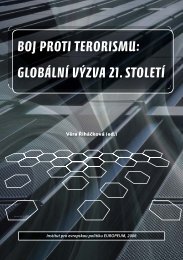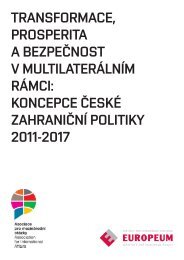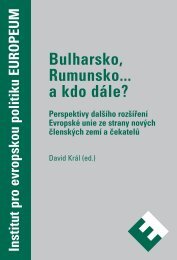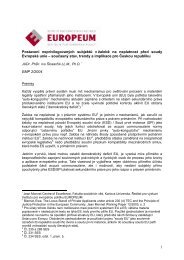eu constitutionalisation - EUROPEUM Institute for European Policy
eu constitutionalisation - EUROPEUM Institute for European Policy
eu constitutionalisation - EUROPEUM Institute for European Policy
You also want an ePaper? Increase the reach of your titles
YUMPU automatically turns print PDFs into web optimized ePapers that Google loves.
Chapter 7: Flexible Integration in the Common Foreign and Security <strong>Policy</strong>Among the most essential conditions figure the obligation to intensivelydevelop the national defence capacities “through the development of itsnational contributions and participation, where appropriate, in multinational<strong>for</strong>ces, in the main <strong>European</strong> equipment programmes and in the activity of theDefence Agency”⁴⁰. Moreover the participating member states should havethe capacity to supply by 2007 at the latest, targeted combat units <strong>for</strong> themissions planned, structured at a tactical level as a battle group, capableof carrying out the extended Petersberg-Missions within a period of 5 to30 days which can be sustained <strong>for</strong> an initial period of 30 days and beextended up to at least 120 days. These combat units are particularly –however not exclusively – designed to carry out operations in response torequests from the United Nations Organisation. Article 2 of the Protocolcontains a list of detailed requirement which the participating states haveto meet, in order to reach the common objectives. Among them figuremeasures to enhance the availability, interoperability, flexibility anddeployability of the <strong>for</strong>ces and to bring the defence apparatus into linewith each other as far as possible by harmonising, pooling and even specialisingthe member state’s defence means and capabilities. To a certainextent, these measures meet the frequent demands, to introduce militaryconvergence criteria in order to close the operative gap.⁴¹ However, thecatalogue on structured cooperation does not tackle the core concern,namely the determination of a financial threshold based on national GNPto be dedicated <strong>for</strong> defence matters.The mechanism of structured cooperation is open to all member statesprovided they do meet the relevant criteria set out in the protocol. Sufficeto notify the intention to the Council and to the Union Minister <strong>for</strong> ForeignAffairs. Thereafter the Council has to adopt, within a time span of threemonth, a <strong>European</strong> decision establishing permanent structured cooperationand determining the list of participating member states. To this endthe Council acts by qualified majority voting after having consulted theUnion Minister <strong>for</strong> Foreign Affairs (Article III-312 para 2 TCE). Any requestto accede permanent structured cooperation at a later stage has to followthe same procedure, except of the fact that effective participation to theCouncil vote is limited to these members representing the participatingStates (Article III-312 para 3 TCE).40) 23. Protocol on Permanent Structured Cooperation, Article 1a.41) MISSIROLI (1999), p. 485.262Chapter 7: Flexible Integration in the Common Foreign and Security <strong>Policy</strong>The rigorous conditionality between participation and the fulfilment of thepre-defined criteria consequently includes the option to suspend memberstates which no longer fulfil the criteria or are no longer able to meet thecommitments. The respective <strong>European</strong> decision taken by the Councilcomposed of the participating countries (except of the member state concerned)has to be based on consolidated findings by the defence agency.A qualified majority shall be defined by at least 55 per cent of the membersof the Council representing the participating member states, comprisingat least 65 per cent of the population of these States.All other decisions taken in the framework of permanent structured cooperationare to be adopted by unanimity by the Council, composed of representativesof the participating countries only (Article III-312 para 6 TCE).In order to prevent the establishment of exclusive clubs, all member statesare entitled to participate in the consultation process. The original intentionas laid down in the Draft Constitution was to normatively link structuredcooperation with the instrument of enhanced cooperation. Accordingto Article III-213 para 5 in the convention’s draft, “[n]otwithstanding theprevious paragraphs, the appropriate provisions relating to enhanced cooperation[ex-Articles III-325 (2) and III-326 (2)] shall apply to the structured cooperationgoverned by this Article”. This provision was misleading since the Articles inquestion mainly refer to the process of establishing or joining enhancedcooperation, which has already been regulated in detail by the draft ArticleIII-213TCE. Consequently the reference to enhanced cooperation has beendropped during the IGC.Moreover, in the framework of the IGC negotiation process the explicitreference was dropped to empower the members of structured cooperationto carrying out crisis management operations. However, one may deducethe general permissibility of such activities from the fact, that permanentstructured cooperation shall not affect the provisions of Article III-309TCE. Furthermore a closer look at the objectives as enacted in the protocolon permanent structured cooperation may shed some additional lighton the role of its members in international crisis management operations.Accordingly they shall “have the capacity to supply by 2007 at the latest, eitherat national level or as a component of multinational <strong>for</strong>ce groups, targeted combatunits <strong>for</strong> the missions planned, structured at a tactical level as a battle group, withsupport elements including transport and logistics, capable of carrying out the tasksreferred to in Article III-309,within a period of 5 to 30 days, in particular in response263








